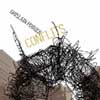 Intr_version continues its winning streak with the fourth release fromunclassifiable French-Canadian maverick Ghislain Poirier, showing himmoving more towards a pure hip-hop sound, while keeping a foot firmlyplaced in the minimal, beautifully melancholic electronica that filledearlier releases like his 12k debut. Conflicts,however, is more a product of contemporary politics than any logicalprogression for the artist himself. Of the twelve tracks, only threeinclude rapping, but the entire disc bears urgent witness to a seriesof protests, struggles, and reconstructions. Poirier's music has neverbeen texturally complex, working instead through the juxtaposition of afew bold layers to create absorbing, cinematic spaces, but where beforea calm, meditative mood was achieved, Conflicts is anxious andpensive. On almost every song, thick, unadorned breaks take theforeground, often lacking more than one or two accompanying layers.Poirier's sonic palette has taken a turn towards grittier, more tactilesounds, like groaning feedback and plodding double bass. The hollowresonance of a plucked bass-note could represent the whole of Conflicts,not thematically vacant, but a record that, on the contrary, suggeststhe bombed-out spaces of the industrial skeleton on its cover. Hooksand melodies emerge in fragmented form and feel barely afloat on thethin strains of stringed instruments and feedback whines that createthe rarely comforting backdrop of most tracks. The album's lyrics areoutwardly political, something obvious to even the non-French speaker,and Poirier's delivery is unique; half spit and half spoken, his wordsare as confrontational as they are musical. The most impressive partsof Conflicts, though, are the instrumentals covering the disc'ssecond half. Poirier has a thing for off-kilter beats that skip around,hitting and missing, but he uses them in a way that is never overkill,managing to keep focus on the physicality of the beat itself withoutslipping into self-parody. He also loves to send rhythms, and entiresongs, sliding arbitrarily into silence, only to bring them staggeringback out for a big finish, a habit made possible by the rich and oftenformless nature of his backgrounds. From a few layers of droningfeedback, Poirier is able to construct an elaborate cradle for therhythms that front each piece, creating music that sounds at times likethe high frequency squeal of Nurse with Wound's Soliloquy for Lilith,put to a skipping backbeat. If Steven Stapleton is really consideringhip-hop for his new direction as he claims to be, he might do worsethan check in on Poirier for some inspiration.
Intr_version continues its winning streak with the fourth release fromunclassifiable French-Canadian maverick Ghislain Poirier, showing himmoving more towards a pure hip-hop sound, while keeping a foot firmlyplaced in the minimal, beautifully melancholic electronica that filledearlier releases like his 12k debut. Conflicts,however, is more a product of contemporary politics than any logicalprogression for the artist himself. Of the twelve tracks, only threeinclude rapping, but the entire disc bears urgent witness to a seriesof protests, struggles, and reconstructions. Poirier's music has neverbeen texturally complex, working instead through the juxtaposition of afew bold layers to create absorbing, cinematic spaces, but where beforea calm, meditative mood was achieved, Conflicts is anxious andpensive. On almost every song, thick, unadorned breaks take theforeground, often lacking more than one or two accompanying layers.Poirier's sonic palette has taken a turn towards grittier, more tactilesounds, like groaning feedback and plodding double bass. The hollowresonance of a plucked bass-note could represent the whole of Conflicts,not thematically vacant, but a record that, on the contrary, suggeststhe bombed-out spaces of the industrial skeleton on its cover. Hooksand melodies emerge in fragmented form and feel barely afloat on thethin strains of stringed instruments and feedback whines that createthe rarely comforting backdrop of most tracks. The album's lyrics areoutwardly political, something obvious to even the non-French speaker,and Poirier's delivery is unique; half spit and half spoken, his wordsare as confrontational as they are musical. The most impressive partsof Conflicts, though, are the instrumentals covering the disc'ssecond half. Poirier has a thing for off-kilter beats that skip around,hitting and missing, but he uses them in a way that is never overkill,managing to keep focus on the physicality of the beat itself withoutslipping into self-parody. He also loves to send rhythms, and entiresongs, sliding arbitrarily into silence, only to bring them staggeringback out for a big finish, a habit made possible by the rich and oftenformless nature of his backgrounds. From a few layers of droningfeedback, Poirier is able to construct an elaborate cradle for therhythms that front each piece, creating music that sounds at times likethe high frequency squeal of Nurse with Wound's Soliloquy for Lilith,put to a skipping backbeat. If Steven Stapleton is really consideringhip-hop for his new direction as he claims to be, he might do worsethan check in on Poirier for some inspiration.samples:
Read More

